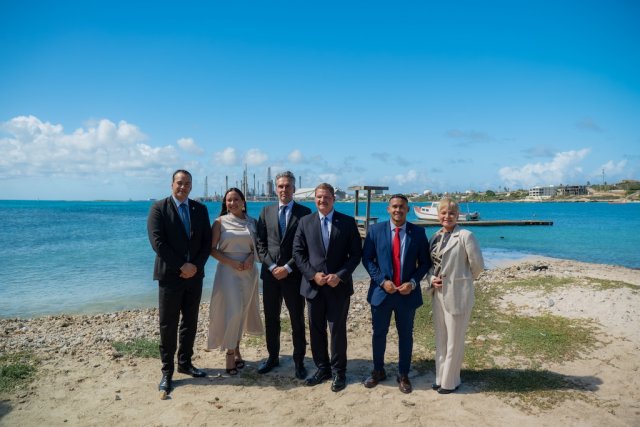Aruba Opens a New Chapter for a Sustainable Future
ORANJESTAD — After nearly a century of economic dependence on the oil industry, Aruba is closing a historic chapter and paving the way for a cleaner, more sustainable, and innovative future.
Since 1924, when the Lago Oil and Transport Company established operations in San Nicolas, Aruba has been a strategic hub in global oil refining. Lago, owned by Exxon, grew into one of the largest refineries in the world, employing more than 10,000 people and supporting the island’s economy for decades.
A few years later, in 1927, Arend Petroleum Company Ltd., commissioned by Royal Dutch Shell, opened in Druif, Oranjestad, in the same building that now houses the Department of Human Resources (DRH). Although smaller in scale, Arend Petroleum played a significant role in Aruba’s economic development until it closed in 1953.
The refinery era came to an end in 1985, when Lago ceased operations. Thousands of Aruban families sought opportunities abroad, while the island itself began searching for a new path forward. In the years that followed, companies such as Coastal Corporation, Valero Energy Corporation, and CITGO Petroleum Corporation attempted to revive the industry—but without lasting success. The final effort, an agreement with CITGO in 2016, ended definitively in 2019 following U.S. sanctions on PDVSA, CITGO’s parent company.
For years, the Government of Aruba sought a new operator to reactivate the refinery and boost the economy of San Nicolas. However, recognizing global trends that prioritize sustainability, clean energy, and environmental stewardship, Prime Minister Mike Eman and his cabinet made a historic decision:
to permanently close the oil chapter and designate the refinery area for the development of alternative, environmentally friendly industries.
“The oil industry has served its historical purpose, but the world has changed,” the government stated. “Aruba must now transition to an economic model built on sustainability, innovation, and clean energy.”
This decision represents more than an industrial shift, it marks a transformation in mindset. After 100 years of oil dependence, Aruba is reaffirming its commitment to a sustainable future for its people.
Plans for the former refinery area include the creation of green industrial zones, innovation hubs, and employment opportunities in renewable energy and the circular economy.
To support this crucial energy transition, the Dutch Government will provide 110 million florins in financial assistance and explore additional technical and knowledge-based support to help remediate the area in the most efficient and responsible way.
During his brief visit to Aruba, outgoing Dutch Prime Minister Dick Schoof praised the Aruban government for its decision and reflected on the deep connection many Aruban families have had with the oil industry.
“For decades, many fathers and mothers built their lives and supported their families through work in this sector,” Schoof said. “That makes this decision even more emotional for the Aruban community, but sustainability requires courage.”

